Appreciation of O Captain! My Captain!
Moby-Dick白鲸解析

Appreciation of Moby-Dick⏹American epic: one of the world’s greatest masterpieces: an encyclopedia of everything,history, philosophy and religion etc.⏹Shakespearean tragedy: man fighting against naturePlotCall Me Ishmael Ishmael, A thoughtful but gloomy young man, Ishmael begins his odyssey in New Bedford, Massachusetts, a prosperous whaling town and crossing point to the island of Nantucket(楠塔基特岛). Queequeg, a fierce-looking harpooner(叉鱼者)covered with tattoos(纹身)and carrying a tomahawk(美洲印第安人用的战斧)and a shrunken head. They sign the ship’s papers, but on their way back to the inn to get their belongings, they meet Elijah(以利亚), a shabbily dressed old man who haunts the docks.Elijah hints at the dangers to come and warns the two not to get involved with the vengeful captain. The Quest The Pequod leaves Nantucket on Christmas day headed for the whaling grounds in the Pacific. Captain Ahab remains in his cabin for several days, while the crew accustoms itself to life at sea. When Ahab does emerge, his appearance startles Ishmael.A long, white scar runs down Ahab's face, and he walks on an artificial leg made of whalebone. Soon he calls the entire crew together and informs them that their voyage will be no ordinary whaling cruise. Ahab has returned to sea with the sole purpose of finding and killing the whale that took his leg on the previous voyage. He offers a sixteen-dollar gold piece to the first man who spots the white whale, Moby-Dick, and drink to the death of the whale.The ChaseCaptain Ahab●“a grand, ungodly, godlike man,”●two things about Ahab, captain of the Pequod in Moby-Dick:●Ahab was orphaned when he was twelve months old,●one of his legs was lost as a result of his most recent whaling voyage.●The wound is so fresh that the stump(残肢)is still bleeding. Ahab does not make aproper appearance in the book until Chapter 28. The long delay in Ahab's involvement in the action of the novel helps to build him up as a grand figure, the major tragic character Melville wants his readers to see.Ishmael(以实玛利)⏹narrator. A rootless individual, brought up as a good Christian⏹Wanderer disinherited and dismissed from his home in favor of his half brother Isaac(以撒). outcast, drifter, no family, no last name. ran away from society to nature. His running away symbolizes human being's departure from Eden.⏹Then after the experience on the sea, he wished to return to the land.⏹He believed God not to be conquered, survived⏹Whiteman who considers Indians as equal and should share brotherly love. (Queequeg’scoffin)Queequeg⏹ a highborn native of an uncharted south-seas island. His father was a High Chief, and hisuncle a High Priest. Queequeg is covered in tattoos(文身)and worships pagan gods, including a small black idol, Yojo.⏹But the real point about Queequeg is his friendliness. He and Ishmael strike up an instantcomradeship.Themes1.Individual Vs. Nature2.(Ahab) versus Nature (symbolized by Moby-Dick)3.Tragic hero\noble4.Tragedy of man: revenge on nature5.Anyone who wants to revenge will be defeatedGod and Religion⏹religion and God's role in the natural world. westward.⏹God and man, who is the controller⏹Nature and man (Newton: man can study\examine nature)Symbols⏹Symbols are objects, characters, figures, or colors used to represent abstract ideas orconcepts.voyage- "search and discovery, the search for the ultimate truth of experience."the Pequod -the ship of the American soulMoby Dick---a symbol of good and evilits whiteness--- paradoxical colorThe Pequod⏹Named after a Native American tribe in Massachusetts⏹did not long survive the arrival of white men and thus turned to be an extinction⏹the Pequod is a symbol of doom.⏹It is painted a gloomy black and covered in whale teeth and bones, --violent death. It is,in fact, marked for death. Adorned (decorate) like a primitive coffin, the Pequod becomes one.⏹American dream :Ishmael thought he found dream and freedom in it.⏹Others sacrifices for the whiteMoby Dick⏹To the Pequod's crew⏹An unknown God whose whiteness represents goodness and tranquility, evil and violence.⏹Ahab : Moby Dick is a manifestation of all that is wrong with the world, and he feels thatit is his destiny to erase this symbolic evil.⏹it represents the destruction of the environment by expansion and exploitation in the 19th⏹For the author and the readers, Ishmael, it is a mystery of the universeQueequeg's Coffin⏹Queequeg‘s coffin alternately symbolizes life and death.⏹Queequeg has it built when he is seriously ill, but when he recovers, it becomes a chestto hold his belongings and an mark of his will to live. He make the knowledge tattooed on his body last forever, by carving it onto the coffin’s lid.⏹The coffin further comes to symbolize life, in a morbid way, when it replaces thePequod…s life buoy(救生衣). When the Pequod sinks, the coffin becomes Ishmael's buoy, saving not only his life but the life of the narrative that he will pass on.The novel can be understood from three levels⏹ 1. It is a novel of journey and whale catching.⏹ 2. It is a conflict between Captain Ahab and Moby Dick.⏹ 3.It is a story of Ishmael, his thought about human body’s ego realization, therelationship between man and nature, man and God, man and man, etc.Melville’s views of lifea. negative attitude towards life.b. One of the major themes of his is alienation (far away from each other.c. Other themes: loneliness, suicidal individualism (individualism causing disaster and death), rejection and quest, confrontation of innocence and evil, doubts over the comforting 19th-century idea of progressMelville’s contr ibution to American literature and featuresAutobiographical elements, Moby-Dick for instance SymbolismAhab Moby dick AND Sea whiteness Pequod VoyageThe style of Melville⏹There is a threefold quality in his writing; the style of fact, the style of oratory celebratingthe fact, and the style of meditation.⏹His style is highly symbolic and metaphorical. The novel has many non-narrative chapters,and this is how Melville changed an adventure story into a philosophical novel.⏹He used the technique of multiple views to achieve the effect of ambiguity.⏹Melville manages to achieve the effect of ambiguity through employing thetechnique of multiple view of his narratives.O Captain My CaptainO Captain my Captain! our fearful trip is done,The ship has weathered every rack(刑架), the prize we sought is won,The port is near, the bells I hear, the people all exulting,While follow eyes the steady keel, the vessel grim and daring;But O heart! heart! heart!O the bleeding drops of red,Where on the deck my Captain lies,Fallen cold and dead.O Captain! my Captain! rise up and hear the bells;Rise up--for you the flag is flung for you the bugle trills,For you bouquets and ribboned wreaths for you the shores a-crowding,For you they call, the swaying mass, their eager faces turning;Here Captain! dear father!This arm beneath your head!It is some dream that on the deck,You've fallen cold and dead.My Captain does not answer, his lips are pale and still;My father does not feel my arm, he has no pulse nor will;The ship is anchored safe and sound, its voyage closed and done;From fearful trip the victor ship comes in with object won;Exult O shores, and ring O bells!But I, with mournful tread,Walk the deck my Captain lies,Fallen cold and dead.。
OCaptainMyCaptain诗朗诵
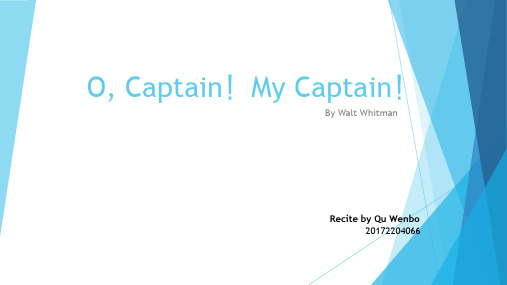
Background
Walt Whitman composed the poem "O Captain! My Captain!" after Abraham Lincoln's assassination in 1865. The poem is classified as an elegy or mourning poem, and was written to honor Abraham Lincoln, the 16th president of the United States. 沃尔特·惠特曼在亚伯拉罕·林肯1865年被暗杀后 创作了这首诗《哦,船长!我的船长!》。这首诗 被归类为挽歌或哀悼诗,该诗为了纪念美国第 16任总统亚伯拉罕·林肯。
Exult, O, shores! And ring, O bells! 啊,岸上钟声齐鸣,啊,人们一片欢腾!
But I, with mournful ['mɔrnfl] tread, 但是,我在甲板上,在船长身旁, Walk the deck my captain lies, 心悲切,步履沉重; Fallen cold and dead.
The ship is anchor’d safe and sound, its voyage closed and done; 船舶抛锚停下,平安抵达;船程终了;
From fearful trip, the victor ship, comes in with object won; 历经难险返航,夺得胜利目标。
Here, Captain! Dear father! 啊,船长!亲爱的父亲!
This arm beneath your head; 我的手臂托着您的头!
o captain my captain韵律
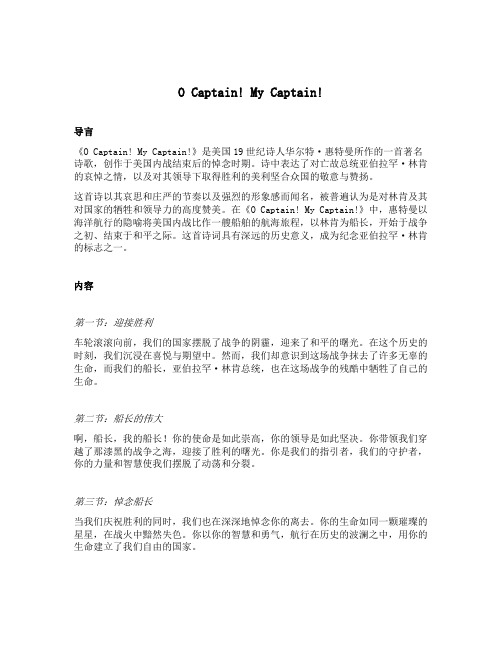
O Captain! My Captain!导言《O Captain! My Captain!》是美国19世纪诗人华尔特·惠特曼所作的一首著名诗歌,创作于美国内战结束后的悼念时期。
诗中表达了对亡故总统亚伯拉罕·林肯的哀悼之情,以及对其领导下取得胜利的美利坚合众国的敬意与赞扬。
这首诗以其哀思和庄严的节奏以及强烈的形象感而闻名,被普遍认为是对林肯及其对国家的牺牲和领导力的高度赞美。
在《O Captain! My Captain!》中,惠特曼以海洋航行的隐喻将美国内战比作一艘船舶的航海旅程,以林肯为船长,开始于战争之初、结束于和平之际。
这首诗词具有深远的历史意义,成为纪念亚伯拉罕·林肯的标志之一。
内容第一节:迎接胜利车轮滚滚向前,我们的国家摆脱了战争的阴霾,迎来了和平的曙光。
在这个历史的时刻,我们沉浸在喜悦与期望中。
然而,我们却意识到这场战争抹去了许多无辜的生命,而我们的船长,亚伯拉罕·林肯总统,也在这场战争的残酷中牺牲了自己的生命。
第二节:船长的伟大啊,船长,我的船长!你的使命是如此崇高,你的领导是如此坚决。
你带领我们穿越了那漆黑的战争之海,迎接了胜利的曙光。
你是我们的指引者,我们的守护者,你的力量和智慧使我们摆脱了动荡和分裂。
第三节:悼念船长当我们庆祝胜利的同时,我们也在深深地悼念你的离去。
你的生命如同一颗璀璨的星星,在战火中黯然失色。
你以你的智慧和勇气,航行在历史的波澜之中,用你的生命建立了我们自由的国家。
第四节:团结与希望面对船长的离去,我们感到了无尽的悲痛。
然而,我们要记住他的精神和奉献,将其传承下去。
船长的领导力和智慧将永远激励着我们,使我们意识到自由和团结的重要性。
第五节:追寻船长的足迹如今,我们继承了船长留给我们的国家。
我们肩负着责任,为了船长的梦想和愿景努力奋斗。
我们要继续前行,追寻船长的足迹,为国家的繁荣和和平不断努力。
结束语《O Captain! My Captain!》是一首充满敬意和悼念的诗歌,表达了对于林肯总统和他所领导的美国的赞美。
The appreciation of O Captain
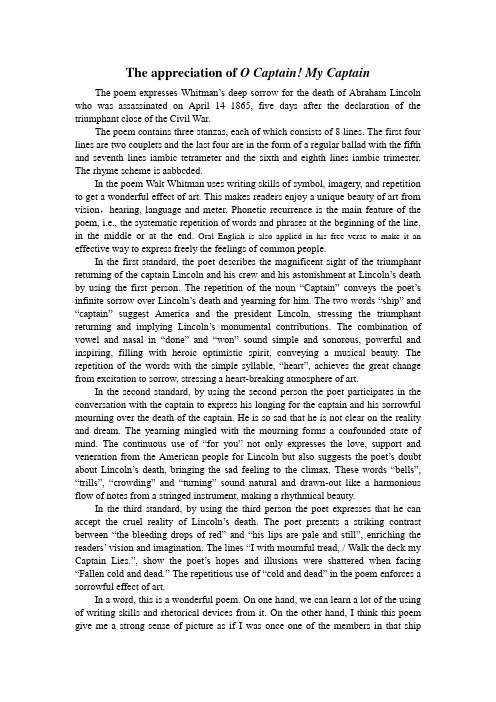
The appreciation of O Captain! My Captain The poem expresses Whitman’s deep sorrow for the death of Abraham Lincoln who was assassinated on April 14 1865, five days after the declaration of the triumphant close of the Civil War.The poem contains three stanzas, each of which consists of 8 lines. The first four lines are two couplets and the last four are in the form of a regular ballad with the fifth and seventh lines iambic tetrameter and the sixth and eighth lines iambic trimester. The rhyme scheme is aabbcded.In the poem Walt Whitman uses writing skills of symbol, imagery, and repetition to get a wonderful effect of art. This makes readers enjoy a unique beauty of art from vision,hearing, language and meter. Phonetic recurrence is the main feature of the poem, i.e., the systematic repetition of words and phrases at the beginning of the line, in the middle or at the end.Oral English is also applied in his free verse to make it an effective way to express freely the feelings of common people.In the first standard, the poet describes the magnificent sight of the triumphant returning of the captain Lincoln and his crew and his astonishment at Lincoln’s death by using the first person. The repetition of the noun “Captain” conveys the poet’s infinite sorrow over Lincoln’s death and yearning for him.The two words “ship” and “captain” suggest America and the president Lincoln, stressing the triumphant returning and implying Lincoln’s monumental contributions.The combination of vowel and nasal in “done” and “won” sound simple and sonorous, powerful and inspiring, filling with heroic optimistic spirit, conveying a musical beauty. The repetition of the words with the simple syllable, “heart”, achieves the great change from excitation to sorrow, stressing a heart-breaking atmosphere of art.In the second standard, by using the second person the poet participates in the conversation with the captain to express his longing for the captain and his sorrowful mourning over the death of the captain. He is so sad that he is not clear on the reality and dream. The yearning mingled with the mourning forms a confounded state of mind. The continuous use of “for you” not only expresses the love, support and veneration from the American people for Linco ln but also suggests the poet’s doubt about Lincoln’s death, bringing the sad feeling to the climax.These words “bells”, “trills”, “crowding” and “turning” sound natural and drawn-out like a harmonious flow of notes from a stringed instrument, making a rhythmical beauty.In the third standard, by using the third person the poet expresses that he can accept the cruel reality of Lincoln’s death.The poet presents a striking contrast between “the bleeding drops of red” and “his lips are pale and still”, enric hing the readers’ vision and imagination. The lines “I with mournful tread, / Walk the deck my Captain Lies.”, show the poet’s hopes and illusions were shattered when facing “Fallen cold and dead.”The repetitious use of “cold and dead” in the poem enforces a sorrowful effect of art.In a word, this is a wonderful poem. On one hand, we can learn a lot of the using of writing skills and rhetorical devices from it. On the other hand, I think this poem give me a strong sense of picture as if I was once one of the members in that shipwhen I read it. This feeling is really excited.。
O captain, my captain分析
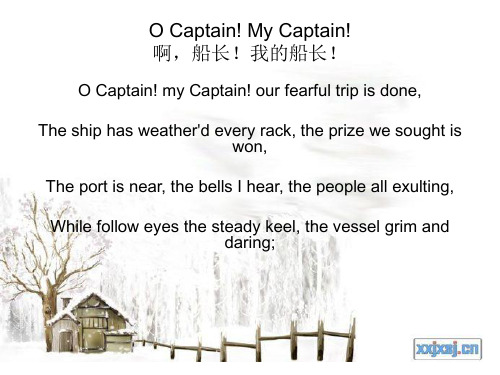
• 在这里,船长!亲爱的父亲!
• • • 你的头颅枕着我的臂膀! 就在这甲板上,如同梦一场, 你倒下了,身体冰凉。
• My Captain does not answer, his lips are pale and still, • My father does not feel my arm, he has no pulse nor will, • The ship is anchor'd safe and sound, its voyage closed and done, • From fearful trip the victor ship comes in with object won; • .
• .
• Here Captain! dear father!
• • • This arm beneath your head! It is some dream that on the deck, You've fallen cold and dead
• 啊,船长!我的船长!起来听这钟声; • 起来——旗帜为你飘扬——号角为你长鸣,
• The forms • There are 3 stanzas of the poem, and there are 8 lines each stanza. • A poem rhymes neat, metrical strictly, which called Whitman "the most traditional" poetry. • There are seven feet and three or four feet alternately, so that the whole poem reads easily to pronounce, smells like the sea surging waves, waves and ripples changing. • The whole poem each stanza strictly rhymes AA BB CD ED. Neat rhyme arrangement enhances the poem power.
o captain my captain修辞手法
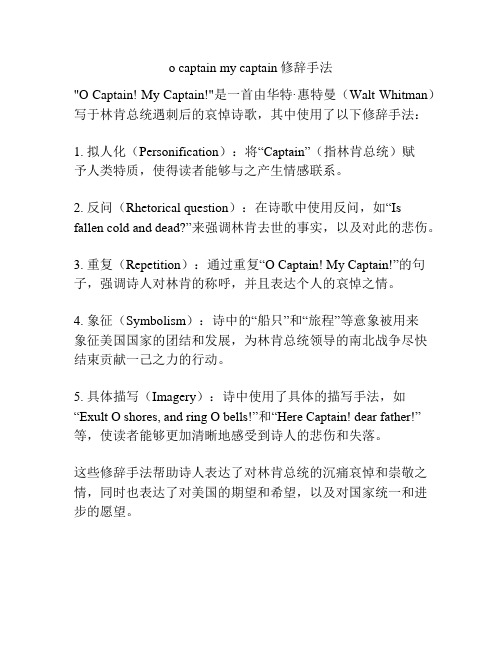
o captain my captain修辞手法
"O Captain! My Captain!"是一首由华特·惠特曼(Walt Whitman)写于林肯总统遇刺后的哀悼诗歌,其中使用了以下修辞手法:
1. 拟人化(Personification):将“Captain”(指林肯总统)赋
予人类特质,使得读者能够与之产生情感联系。
2. 反问(Rhetorical question):在诗歌中使用反问,如“Is fallen cold and dead?”来强调林肯去世的事实,以及对此的悲伤。
3. 重复(Repetition):通过重复“O Captain! My Captain!”的句子,强调诗人对林肯的称呼,并且表达个人的哀悼之情。
4. 象征(Symbolism):诗中的“船只”和“旅程”等意象被用来
象征美国国家的团结和发展,为林肯总统领导的南北战争尽快结束贡献一己之力的行动。
5. 具体描写(Imagery):诗中使用了具体的描写手法,如“Exult O shores, and ring O bells!”和“Here Captain! dear father!”等,使读者能够更加清晰地感受到诗人的悲伤和失落。
这些修辞手法帮助诗人表达了对林肯总统的沉痛哀悼和崇敬之情,同时也表达了对美国的期望和希望,以及对国家统一和进步的愿望。
Captain! My Captain (船长,我的船长)
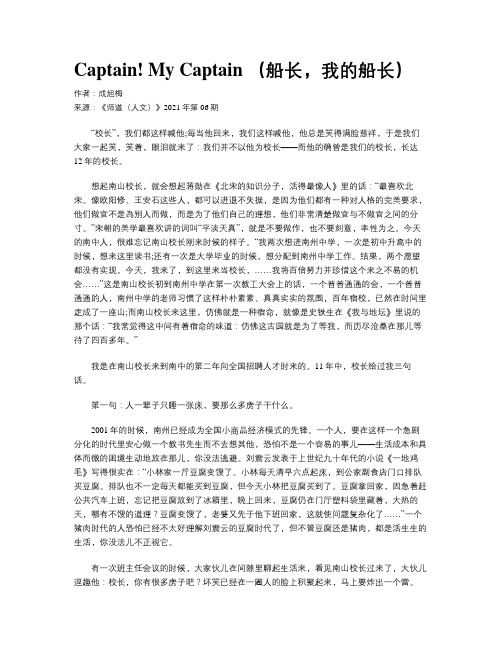
Captain! My Captain (船长,我的船长)作者:成旭梅来源:《师道(人文)》2021年第06期“校长”,我们都这样喊他;每当他回来,我们这样喊他,他总是笑得满脸慈祥,于是我们大家一起笑,笑着,眼泪就来了:我们并不以他为校长——而他的确曾是我们的校长,长达12年的校长。
想起南山校长,就会想起蒋勋在《北宋的知识分子,活得最像人》里的话:“最喜欢北宋。
像欧阳修、王安石这些人,都可以进退不失据,是因为他们都有一种对人格的完美要求,他们做官不是為别人而做,而是为了他们自己的理想,他们非常清楚做官与不做官之间的分寸。
”宋朝的美学最喜欢讲的词叫“平淡天真”,就是不要做作,也不要刻意,率性为之。
今天的南中人,很难忘记南山校长刚来时候的样子。
“我两次想进南州中学,一次是初中升高中的时候,想来这里读书;还有一次是大学毕业的时候,想分配到南州中学工作。
结果,两个愿望都没有实现。
今天,我来了,到这里来当校长,……我将百倍努力并珍惜这个来之不易的机会……”这是南山校长初到南州中学在第一次教工大会上的话,一个普普通通的会,一个普普通通的人,南州中学的老师习惯了这样朴朴素素、真真实实的氛围,百年宿校,已然在时间里走成了一座山;而南山校长来这里,仿佛就是一种宿命,就像是史铁生在《我与地坛》里说的那个话:“我常觉得这中间有着宿命的味道:仿佛这古园就是为了等我,而历尽沧桑在那儿等待了四百多年。
”我是在南山校长来到南中的第二年向全国招聘人才时来的。
11年中,校长给过我三句话。
第一句:人一辈子只睡一张床,要那么多房子干什么。
2001年的时候,南州已经成为全国小商品经济模式的先锋。
一个人,要在这样一个急剧分化的时代里安心做一个教书先生而不去想其他,恐怕不是一个容易的事儿——生活成本和具体而微的困境生动地放在那儿,你没法逃避。
刘震云发表于上世纪九十年代的小说《一地鸡毛》写得很实在:“小林家一斤豆腐变馊了。
小林每天清早六点起床,到公家副食店门口排队买豆腐。
杰克船长经典语录名言名句
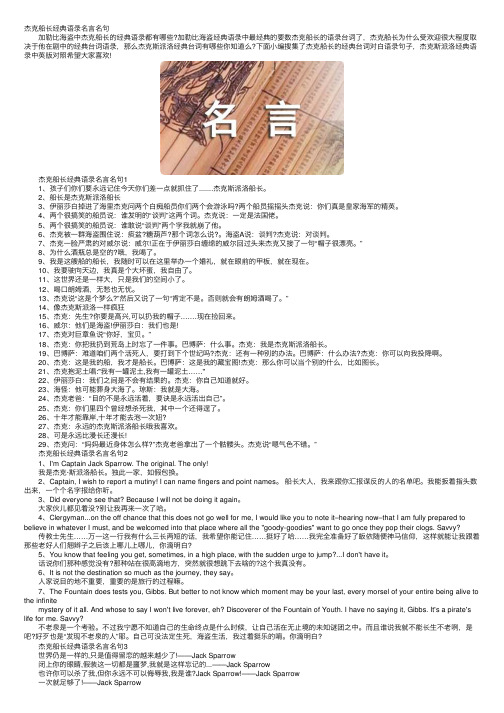
杰克船长经典语录名⾔名句 加勒⽐海盗中杰克船长的经典语录都有哪些?加勒⽐海盗经典语录中最经典的要数杰克船长的语录台词了,杰克船长为什么受欢迎很⼤程度取决于他在剧中的经典台词语录,那么杰克斯派洛经典台词有哪些你知道么?下⾯⼩编搜集了杰克船长的经典台词对⽩语录句⼦,杰克斯派洛经典语录中英版对照希望⼤家喜欢! 杰克船长经典语录名⾔名句1 1、孩⼦们你们要永远记住今天你们差⼀点就抓住了.......杰克斯派洛船长。
2、船长是杰克斯派洛船长 3、伊丽莎⽩掉进了海⾥杰克问两个⽩痴船员你们两个会游泳吗?两个船员摇摇头杰克说:你们真是皇家海军的精英。
4、两个很搞笑的船员说:谁发明的“谈判”这两个词。
杰克说:⼀定是法国佬。
5、两个很搞笑的船员说:谁敢说“谈判”两个字我就崩了他。
6、杰克被⼀群海盗围住说:痰盆?糖葫芦?那个词怎么说?。
海盗A说:谈判?杰克说:对谈判。
7、杰克⼀脸严肃的对威尔说:威尔!正在于伊丽莎⽩缠绵的威尔回过头来杰克⼜接了⼀句“帽⼦很漂亮。
” 8、为什么酒瓶总是空的?哦,我喝了。
9、我是这艘船的船长,我随时可以在这⾥举办⼀个婚礼,就在眼前的甲板,就在现在。
10、我要驶向天边,我真是个⼤坏蛋,我⾃由了。
11、这世界还是⼀样⼤,只是我们的空间⼩了。
12、喝⼝朗姆酒,⽆愁也⽆忧。
13、杰克说“这是个梦么?”然后⼜说了⼀句“肯定不是。
否则就会有朗姆酒喝了。
” 14、像杰克斯派洛⼀样疯狂 15、杰克:先⽣?你要是⾼兴,可以扔我的帽⼦.……现在捡回来。
16、威尔:他们是海盗!伊丽莎⽩:我们也是! 17、杰克对巨章鱼说“你好,宝贝。
” 18、杰克:你把我扔到荒岛上时忘了⼀件事。
巴博萨:什么事。
杰克:我是杰克斯派洛船长。
19、巴博萨:难道咱们两个活死⼈,要打到下个世纪吗?杰克:还有⼀种别的办法。
巴博萨:什么办法?杰克:你可以向我投降啊。
20、杰克:这是我的船,我才是船长。
巴博萨:这是我的藏宝图!杰克:那么你可以当个别的什么,⽐如图长。
- 1、下载文档前请自行甄别文档内容的完整性,平台不提供额外的编辑、内容补充、找答案等附加服务。
- 2、"仅部分预览"的文档,不可在线预览部分如存在完整性等问题,可反馈申请退款(可完整预览的文档不适用该条件!)。
- 3、如文档侵犯您的权益,请联系客服反馈,我们会尽快为您处理(人工客服工作时间:9:00-18:30)。
Appreciation of O Captain! My Captain!Walt Whitman was born on the 31st of May, 1819, in Long Island, New Y ork. His life’s work, Leaves of Grass, made him one of the first American poets to be famous world wide. O Captain! My Captain!by Walt Whitman is an elegy, as it was written to honor the death of President Abraham Lincoln after his assassination. This poem bears little resemblance to his other, more experimental writings, and it is a rare example of his use of rhymed, rhythmically regular verse, which serves to create a somber yet exalted effect.T ext AnalysisO Captain! My Captain! is a simple, three-stanza poem:●Stanza I describes the scene where “the ship has weather’d every rack, the prize we sought iswon”but “where on the deck my Captain lies, Fallen cold and dead”. The poet regards President Lincoln as “my Captain” and deeply expresses his respect for him from the point ofa sailor or a soldier.●Stanza II portrays how people celebrates the triumph of the ship and their leader---“they call,the swaying mass, their eager faces turning ” with the bugle trilling, the flag flung, which is rather spectacular and shows the whole nation’s sincere love an respect for President Lincoln.In this stanza, the poet refers to the fallen Caption as “father”, a near-and-dear call, representing his deep admiration for President Lincoln and Lincoln’s role as father of the nation.●Stanza III expresses the poet’s profound sorrow for President Lincoln’ death. He comes backto earth and recognizes that “Walk the deck my Captain lies, Fallen cold and dead”. Here the poet refers the Captain as “he”, an indication of his somber desperation and extreme grief. The poet’s distress is accentuated by the contrasting celebrations of victory and lamentations of death. The poet recognizes the importance of victory, calling out "Exult O shores, and ring O bells!”, but his "mournful tread" prevents him from truly taking part in the festivities. The image of the dead captain---"O heart! Heart! Heart! / O bleeding drops of red”--- haunts the poem and the reader is constantly reminded that he has "fallen cold and dead."Writing devices●Symbolism---Walt Whitman wrote the poem after Abraham Lincoln's assassination.Repeated symbolic reference is made to this issue throughout the verse. The "ship" spoken of is intended to represent the United States of America, while its "fearful trip" recalls the troubles of the American Civil War. The titular "Captain" is Lincoln himself. The prize is the preservation of the nation.●Rhyme Scheme--- The poem contains three stanzas, each of which consists of 8 lines. Thefirst four lines are two couplets and the last four are in the form of a regular ballad with the fifth and seventh lines iambic tetrameter and the sixth and eighth lines iambic trimeter. The rhyme scheme is aabb cded.●Meter and Rhythm---there is a pattern of four long lines followed by four short lines ineach stanza. The shortened lines emphasize the personal grief experienced by the poetagainst the backdrop of a broader victory. The poem's rhythm is created by the varying line lengths.●Repetition---the repeated use of "heart" in line 5 emphasizes the poet's grief at the death ofhis captain. "Fallen cold and dead" is repeated at the end of each stanza to emphasize the poet's deep loss.●Apostrophe---an apostrophe is a form of personification in which an individual addressessomeone who is dead, someone who is not there, or an inanimate object. "O Captain! My Captain!" at the start of the first two stanzas are examples of apostrophe, as is "Exult O shores, and ring O bells!" in the third stanza.ThemeThe poet is trying to communicate with readers his acknowledgement and love for President Lincoln and his grief of his death in O Captain! My Captain! The poem takes the form of an ode characterized by sustained noble sentiment and appropriate dignity of style. Walt Whitman speaks not only for himself, but for his whole nation America as Abraham Lincoln is the savior of their nation, and they embrace him as their hero.Walt Whitman is often referred to as the “poet of democracy”. He had a strong sense of mission. Most of his works are concerned about freedom, justice and individualism. In fact, President Abraham Lincoln is a symbol of democracy. To speak high of President Abraham Lincoln is to praise the spirit of sacrifice in the course of pursuing of freedom and justice.。
